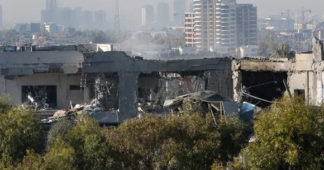Account also cites Israeli official saying a 2nd missile fired at Iranian antiaircraft battery was destroyed by the IAF en route, once it was clear the first had reached its target
Apr. 22, 2024
Israel’s original retaliatory plan against Iran included a much wider counterstrike on military targets, including near Tehran, The New York Times reported on Monday, citing three Israeli officials.
“Such a broad and damaging attack would have been far harder for Iran to overlook, increasing the chances of a forceful Iranian counterattack,” the paper said.
As has been widely reported, Israel shelved plans for an immediate response to Iran’s unprecedented direct attack on April 13-14 when it became clear that Israel had thwarted most of the Iranian missiles and drones with the help of a US-led coalition, and after a phone call that night between US President Joe Biden and Prime Minister Benjamin Netanyahu
Israel ultimately opted for a less powerful response, carried out overnight Thursday-Friday, amid intensive diplomatic pressure to avoid an escalation of the direct hostilities.
Citing Israeli and Western officials, the Times account also said Israel fired “a small number of missiles” from aircraft stationed several hundred miles west of Iran, and also launched small attack drones, known as quadcopters, “to confuse Iranian air defenses.”
A single missile hit an antiaircraft battery in a strategically important part of central Iran, the report said — previous accounts had indicated this was part of the S-300 air defenses for the Natanz nuclear facility — while another exploded in midair.
An Israeli official was quoted as saying this second missile was destroyed by the Air Force “once it became clear that the first had reached its target, to avoid causing too much damage.” The Times also cited a Western official who suggested the second missile may have “simply malfunctioned.”
Continue reading at www.timesofisrael.com
We remind our readers that publication of articles on our site does not mean that we agree with what is written. Our policy is to publish anything which we consider of interest, so as to assist our readers in forming their opinions. Sometimes we even publish articles with which we totally disagree, since we believe it is important for our readers to be informed on as wide a spectrum of views as possible.











